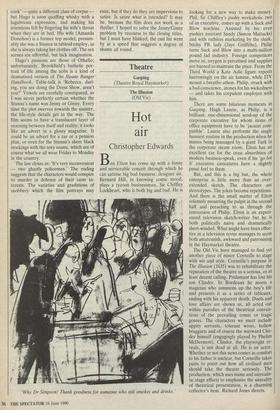Theatre
Gasping (Theatre Royal Haymarket) The Illusion (Old Vic)
Hot air
Christopher Edwards
Ben Elton has come up with a funny and serviceable conceit through which he can satirise big bad business: designer air. Bernard Hill, in knowing comic mood, plays a tycoon businessman, Sir Chiffley Lockheart, who is both big and bad. He is
`Why Dr Simpson! Thank goodness for someone who still smokes and drinks.'
looking for a new way to make money. Phil, Sir Chiffley's pushy workaholic twit of an executive, comes up with a Suck and Blow machine. Assisted by his even pushier assistant Sandy (Simon Mattacks) and with ruthless marketing by the sleek, bitchy PR lady (Jaye Griffiths), Philip turns Suck and Blow into a multi-million pound fad industry. Foreign competitors move in, oxygen is privatised and supplies are burned to maintain the price. From the Third World a Kate Adie figure reports harrowingly on the air famine, while ITV mount a breathe-athon. Philip, struck with a bad conscience, atones for his wickedness — and takes his corpulent employer with him.
There are some hilarious moments in Gasping. Hugh Laurie, as Philip, is a brilliant, one-dimensional send-up of the corporate executive for whom items of office equipment have to be `jacuzzi com- patible'. Laurie also performs the single funniest routine in the production when he mimes being massaged by a giant Turk in the corporate steam room. Elton has an excellent ear for the crass absurdities of modern business-speak, even if his 'go for it' executive caricatures have a slightly passe feel to them.
But, and this is a big but, the whole enterprise is little more than an over- extended sketch. The characters are stereotypes. The jokes become repetitious. And there is the small matter of Elton solemnly mounting the pulpit in the second half and preaching to us through the conversion of Philip. Elton is an experi- enced television sketch-writer but he is both politically naïve and dramatically short-winded. What might have been effec- tive in a television revue manages to seem both amateurish, awkward and patronising in the Haymarket theatre. The Old Vic have managed to find yet another piece of minor Corneille to stage with wit and style. Corneille's purpose in The Illusion (1635) was to rehabilitate the reputation of the theatre as a serious, or at least decent calling. Pridamant has lost his son Clindor. In Bordeaux he meets a magician who summons up the boy's life and presents it as a series of tableaux, ending with his apparent death. Duels and love affairs are shown us, all acted out within parodies of the theatrical conven- tions of the prevailing comic or tragic genres. The characters we meet include uppity servants, tolerant wives, hollow braggarts and of course the wayward Clin- dor himself (engagingly played by Phelim McDermott). Clindor, the playwright re- veals, is not dead at all. He is an actor. Whether or not this news comes as comfort to his father is unclear, but Corneille takes pains to point out how all civilised men should take the theatre seriously. The production, which uses mime and surrealis- tic stage effects to emphasise the unreality of theatrical presentation, is a charming collector's item. Richard Jones directs.


















































 Previous page
Previous page